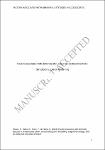Factors associated with dementia attitudes in an adolescent cohort: structural equation modelling
| dc.contributor.author | Hassan, E | |
| dc.contributor.author | Hicks, B | |
| dc.contributor.author | Tabet, N | |
| dc.contributor.author | Farina, N | |
| dc.date.accessioned | 2023-07-18T08:13:06Z | |
| dc.date.available | 2023-07-18T08:13:06Z | |
| dc.date.issued | 2023-07-16 | |
| dc.identifier.issn | 2331-1908 | |
| dc.identifier.issn | 2331-1908 | |
| dc.identifier.other | ARTN 2235125 | |
| dc.identifier.uri | https://pearl.plymouth.ac.uk/handle/10026.1/21049 | |
| dc.description.abstract |
Dementia-related stigma is a key barrier to people living well with dementia, leading to social isolation and poor well-being. Adolescents represent an under-researched group that will become future carers and healthcare workers for the estimated 83.2 million people who will be living with dementia by 2030. Understanding the factors involved in dementia attitude formation in adolescents is useful for the development of evidence-based anti-stigma initiatives. This study aims to identify predictors of dementia attitudes in adolescents. This is a cross-sectional study using secondary data analysis. 470 participants aged 12–15 years old from secondary schools in the Southeast of England, United Kingdom completed validated questionnaires relating to dementia attitudes (KIDS and Brief A-ADS) as well as demographic information. Multiple regressions were employed as well as a path analysis via a structural equation model to test for direct and mediatory effects. Multiple regression models revealed that being female, having higher levels of contact with dementia, and higher levels of empathy are positively associated with dementia attitudes in adolescents (p<0.05). Within the accepted structural equation model, empathy was a key mediator between contact and dementia attitudes. This study highlights the pivotal role that contact with dementia can have in influencing dementia attitudes in adolescents with empathy serving as a mediator between contact and dementia attitudes. Interventions that use contact should consider how to stimulate empathetic responses to ultimately shape dementia attitudes. | |
| dc.format.extent | 23311908.2023.2235125- | |
| dc.format.medium | Electronic-eCollection | |
| dc.language | en | |
| dc.publisher | Informa UK Limited | |
| dc.subject | SEM | |
| dc.subject | secondary analysis | |
| dc.subject | stigma | |
| dc.subject | students | |
| dc.title | Factors associated with dementia attitudes in an adolescent cohort: structural equation modelling | |
| dc.type | journal-article | |
| dc.type | Article | |
| plymouth.author-url | https://www.ncbi.nlm.nih.gov/pubmed/38304300 | |
| plymouth.issue | 1 | |
| plymouth.volume | 10 | |
| plymouth.publisher-url | http://dx.doi.org/10.1080/23311908.2023.2235125 | |
| plymouth.publication-status | Published | |
| plymouth.journal | Cogent Psychology | |
| dc.identifier.doi | 10.1080/23311908.2023.2235125 | |
| plymouth.organisational-group | |Plymouth | |
| plymouth.organisational-group | |Plymouth|Faculty of Health | |
| plymouth.organisational-group | |Plymouth|Users by role | |
| plymouth.organisational-group | |Plymouth|Users by role|Academics | |
| plymouth.organisational-group | |Plymouth|Faculty of Health|Peninsula Medical School | |
| dc.publisher.place | England | |
| dcterms.dateAccepted | 2023-07-06 | |
| dc.date.updated | 2023-07-18T08:13:04Z | |
| dc.rights.embargodate | 2023-7-18 | |
| dc.identifier.eissn | 2331-1908 | |
| dc.rights.embargoperiod | forever | |
| rioxxterms.versionofrecord | 10.1080/23311908.2023.2235125 |


